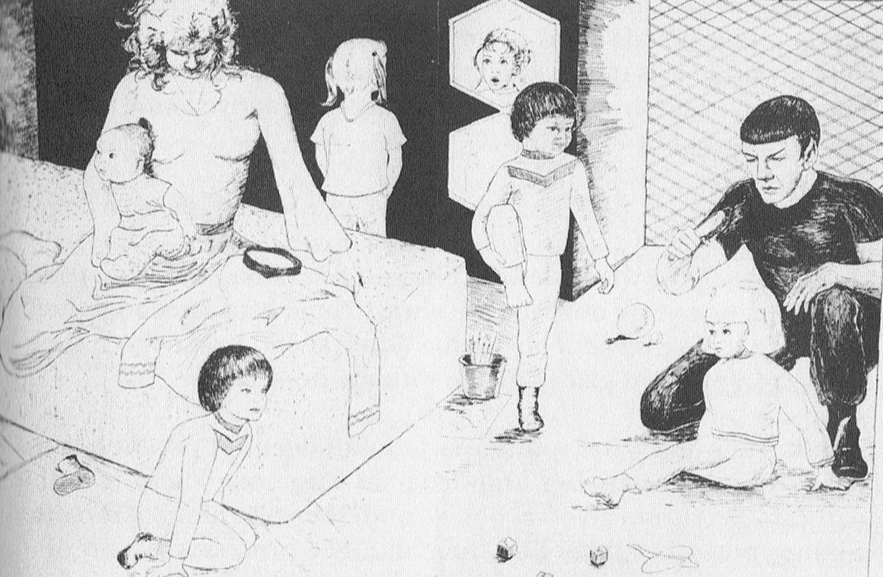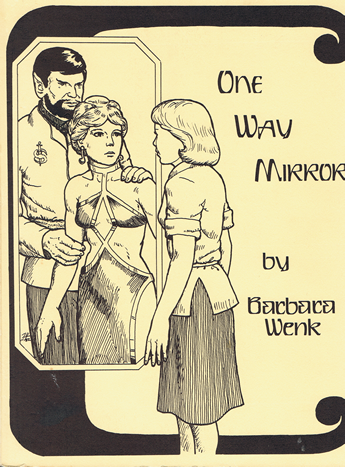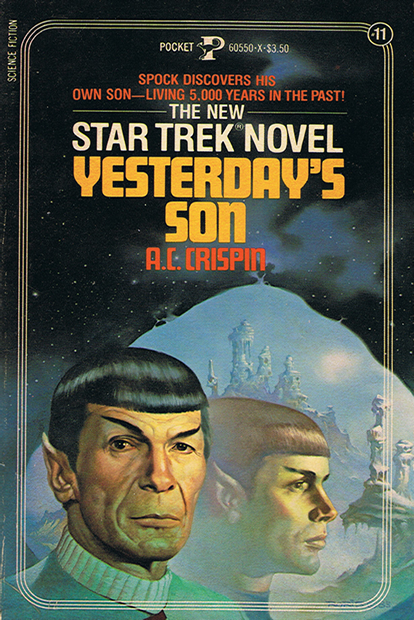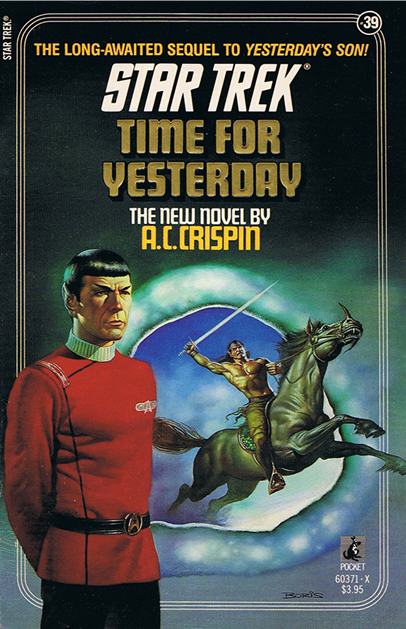Star Trek
"All Our Yesterdays"
Season 3 Episode 78
Synopsis
Beta Niobe, a sun orbited by a sole planet, is expected to go nova in three and a half hours. The planet, Sarpeidon, is known to harbor intelligent humanoid life. The Enterprise is sent to the rescue on an impossibly short notice.
Summary:
Upon arrival they find the planet empty. The population, it turns out, has already taken care of the problem. But Kirk, Spock and McCoy do not know that yet when they beam down to follow a power signature. They are met by an elderly man who is irritated with them for being late for their own rescue. From him they learn that they're in a library, and that he is the librarian, and that they are expected to choose their destination. When the librarian, who goes by the name of Atoz, continues to pop up places, Kirk begins to suspect something's off. Atoz explains, upon questioning, that he had to replicate himself because there was too much to do and only one of him to do it. Alone, the task of sending the population to a save place would have been impossible to execute. Peculiar of character himself, he thinks Kirk and company rather dense because they don't seem to get what's expected of them. He asks Kirk what time period he's interested in and sits him down in front of a viewer where the planet's more recent history is displayed. McCoy, in the meantime, takes a look at a disk that shows nothing but snow and ice while Spock, with no success, tries to get information out of Atoz about a machine he's working on. Then everything happens fast. Kirk hears a woman scream, jumps up, and runs out of the door of the library. Before they think to question the strange effect that engulfs him, Spock and McCoy are out of the door, too, ignoring Atoz protests that they have to be prepared first.
Here we'll leave Kirk to his own devices, since he eventually manages to deliver himself from this mess of his own making. Let it suffice to say that he engages in swordplay in a time period reminiscent of the renaissance, saves the fair maiden, gets thrown into a dungeon and accused of witchcraft by same maiden in the course of it.
Spock and McCoy on the other hand find themselves in an icy wasteland. They can still communicate through time (audio only) because all three of them stand close to the time portal that they came through. Before they can locate the way back to the library Spock and McCoy loose contact with Kirk, though. Without Kirk's voice to guide them, all rocks suddenly look the same. They can't find shelter and after a while McCoy is ready to lie down and die. Spock urges him on but McCoy insists that he leave him behind and save himself. Just in time a figure wrapped in fur from head to toe appears and motions the men to follow it. They are led to a cave where Spock beds the now unconscious McCoy on furs. The mysterious figure finally throws back the hood of her coat and reveals herself to be a woman. She is intrigued by Spock's features because she's never seen anybody like him. He explains that he's from much further away than just time. She is delighted and confesses that she's always had an interest in stories about the possibilities of space travel but in the next moment becomes distraught because those of course were nothing more than stories and not reality. She is afraid that she's going insane from loneliness and starting to imagine things. Spock can convince her that he is real and also learns that she has been sent into the ice age by a tyrant out of revenge for the attempt on his life by two of her kinsman.
As the two get to know each other better, Spock requests that Zarabeth helps him find the time portal so that he can go and rescue Kirk. He who usually avoids touch drags Zarabeth to her feet in his eagerness to implement his plan. As she points out the holes in it, aka a still unconscious McCoy, it dawns on Spock that not all is well with him. His logic has deserted him and his decision-making process no longer equals a smooth equation. Now messy emotions get in the way of it. He suspects the machinery in the library to be reason for what is happening to him. Zarabeth tells him that as far as she knows nobody can return to their original time because the atavachron changes the basic cell structure of the body during adjustment and that she's sure she'd die should she herself try.
Later, Spock repeats what Zarabeth has told him to a now awake McCoy who is not too happy with what he's hearing. Later again, we see McCoy now well and flirting with Zarabeth and engaging in banter with Spock who throws him ominous dark looks. As the Doctor muses where Kirk might be and Spock's reaction to this borders on the indifferent, McCoy suddenly becomes alarmed. He diagnoses that it is not Spock's nature to give up just like that. He needles the Vulcan until Spock looses it, grabs the Doctor by the collar and tells him he doesn't like being called names and hasn't for a long time. McCoy has an epiphany.
Zarabeth and Spock spend some more time with each other. Spock apologizes because he cannot think of a way to bring her back in time but she tells him she has accepted that this is now her time and that she will live out her life here. They talk some about loneliness and find a kindred soul in each other. Zarabeth urges him to finally eat something and because it would please her, he obliges. The only thing she can offer is meat, though. Since the source for warmth in the cave is a hot spring, Spock thinks he can build a greenhouse in the future. Meanwhile, meat has to do, he concludes and takes a bite. But he draws the line at telling her how beautiful she is and how Zorkan wronged her. He really gets upset with himself for saying such things and asks her not to pay attention to him. It takes only a few more moments and his mood swings back in the other direction. Over what happens next, the camera dissolves discreetly.
McCoy finds them cuddled up with each other on the floor next to the foot of the bed when he comes to pursue his sudden insight from a paragraph above. He accuses Zarabeth of lying and Spock of accepting the lie because he wants to. She would do anything the Doctor says to end her loneliness - lie, cheat or kill. While she cannot return, the same is not necessarily true for them. The implication is that he and Spock have not been long enough in Zarabeth's time period to be affected in the same way she is. When McCoy again oversteps his boundaries, Spock again goes for his throat. The Doctor uses Spock's current behavior as an example to drive his point home: that Spock is little by little reverting to the state of barbarism of his ancestors five thousand years ago. The realization shocks him out of it enough to seriously enquire of Zarabeth whether they can go back to their own time. She says she honestly does not know. The only thing she is sure about is that she has to stay. McCoy is determined to try it, even if it's the last thing he does. Spock and Zarabeth accompany him to where they first entered into the ice age, holding hands. Just when it seems fruitless to continue, they hear Kirk's voice that guides them to the portal. Spock finds it impossible to leave Zarabeth behind as time runs out for them in the future. He grabs McCoy and pushes him against the rock, intending to send him back alone, but the Doctor bounces back. It seems that both have to go through the portal or non of them. Heartbroken, Zarabeth walks away from Spock to give him the freedom to return.
Back in the library, Spock states that it is no longer necessary for McCoy to keep him under observation. What happened, happened 5000 years ago and Zarabeth was dead and buried long ago. For once, McCoy leaves Spock alone. The sun explodes and the Enterprise rushes away.
Review:
Setting a time limit is a filmic device to produce a sense of urgency. Once the episode looses this out of sight when the primary concern becomes how the protagonists can return, if they can return at all, and the need to unite again, time curiously seems to stretch. While watching All Our Yesterdays I constantly had to remind myself that everything happened in the three and a half hours specified in the prologue. For the characters act like they have all the time in the world when that world specifically was about to end on a schedule in their own time. McCoy takes the time to flirt with Zarabeth, wistfully wonders what Kirk might be doing and assumedly looks the other way when Spock and Zarabeth get rather friendly with each other. Let's not forget that right before he had an inspiration that he thought could solve their problem with dying when they go back to the future. McCoy, always one for taking impulsive action, does not jump on the occasion to tell Spock immediately and then the episode next cuts to Kirk in the dungeon. Time is set up to run parallel in all three locations in All Our Yesterdays. So, while we see Kirk, time also passes where Spock and McCoy are - albeit unseen. Two things struck me as odd when viewing the show. First, why they, particularly McCoy, obsess about spatial displacement and separation from the group when time running out should be their most pressing concern and secondly, why McCoy (and Kirk) seem unaffected while Spock grossly behaves out of character. But then they are not. As Zarabeth explains, the machine alters the mind-set of the people that pass through it to provide contentment whenever they are. As she tells them: "It's not that I wish to return, this is my time now. I've had to face that." The humans (and Zarabeth) are just not affected in the same or dramatic way that Spock is. Their alteration is much more subtle in the way it affects them: time looses importance over place. Kirk's attempt to escape from the dungeon is not so much motivated by the fact that he has to get back before the sun goes nova but the need to escape his witchcraft trial, as stated in his captain's log. A sense of urgency is reintroduced when Kirk learns that because he came to the past without adequate preparation, he only has hours to live - something that remains unknown to Spock and McCoy. While in the past, all three fail to concern themselves with the passage of time and how it relates to their ability to get back. The nova, and with it the original reason to make haste, only becomes a concern again once Kirk is back in the library.
Once you remind yourself that everything that happens to Spock takes place within mere hours, it all takes on an air of unreality. It is only fitting then that McCoy makes a remark to this effect as the episode winds down. The third season always gets thrashed for being the worst in the run of Star Trek, but actually this episode is quite cleverly constructed plotwise - linking the viewing experience with what the characters go through. Care is also taken to not make Zarabeth into a liar. To the best of her knowledge she tells them what she knows about how the atavachron works. Her information later is verified by someone Kirk has contact with who's a bit more sophisticated than she is. Which leads to the discovery that there is some sort of preparation process necessary for permanent time displacement, the means of which never are explained, though. This makes the emotional impact of the show all the more powerful, because even as McCoy tries to smear her reputation and the audience is invited several times to mistrust her, Zarabeth comes through clean. It is McCoy's logic that is faulty. Like Kirk they can only return because they didn't catch Mr. Atoz warnings - the amount of time spent in the past had nothing to do with it.
Somewhere I read that in the third season Spock acted more out of character than in character, one of the many complaints raised against this season. Upon rewatching the episode after a long time the thing that surprised me the most, though, was just how carefully the characters were handled in All Our Yesterdays and how it all adds up.
| Mariette Hartley. Creation Convention Appearance. Salute to Star Trek's 40th Anniversary. |
Impact of Episode on Trek Universe
Zarabeth comes across as just a regular gal with unfortunate family relations with a knack for science fiction and Spock. While I wouldn't go so far as to say that Zarabeth is Mary Sue's grandma, fan fiction is rich on stories that bear resemblance with her predicament. Namely, regular gal (main difference from a Mary Sue) through circumstances beyond her control ends up entangled with officer of the Enterprise and they often start a family. The Displaced can be considered an example of this as can another classic of the genre, One Way Mirror. The author of Enterprising Women rates The Displaced a "lay Spock" story (no need to explain that term, I'm sure) and I'd say All Our Yesterdays ranges definitely within that category - hell, it might have constituted this particular sub-genre. Of the women characters in those early stories Camille Bacon-Smith writes, "The female hero is not an adolescent but a mature adult woman who rejects traditional male explanations for her perceptions." Zarabeth refutes him on all accounts when McCoy accuses her to be ready to lie, cheat, even murder him to keep Spock to herself.
There are visual cues that would suggest Zarabeth might not tell the truth at times. When she tells Spock that he and McCoy cannot return to the future for the first time, she turns around to untie the fur wrapped around her legs and therefore has no eye contact with Spock when she does so and when Spock relates this to McCoy she enters the scene in a way that could be described as slightly threatening. That she turns out a prisoner does not invite trust either. Bacon-Smith continues to say that, "[t]he most obvious and striking difference between the lay-Spock and the Mary-Sue, of course, is the open expression of satisfied sexual desire and the link between sexual satisfaction and trust established in the stories." (1) In the episode Spock announces with utter conviction to the Docor that Zarabeth would never do harm to anyone after their little tête-à-tête. There is one more thing that suggest that Zarabeth is the genuine thing. Right after she tells Spock what she knows about how the atavachron works, she is contrasted with the person Kirk gains his information from that I have described as more sophisticated above. I myself can go, buy hardware and build my computer to my liking while almost anybody of my acquaintance goes to the store, buys a PC and pushes the on-switch while I have to connect the on-switch to the mother-board first. Zarabeth is the kind of person who knows how to push the on-switch while Kirk's informant describes the process in greater detail and his language also differs from the more simple and general explanation she gives. If she leaves something out, it's not out of an ulterior motive.
 |
 |
 |
 |
Oh, and did I say McCoy left Spock alone? What could be assumed to have transpired after the cut to Kirk's location was just to juicy to leave it alone. Thus the episode spawned two novels from Pocket Books that deal with the aftermath of the crew's visit to Sarpeidon. As it turns out, Spock and Zarabeth had a son who turns up within data that the Enterprise scanned and recorded from the library. The image of what could only be a member of the Vulcan race is displayed on a cave painting and it has the young scientist mighty puzzled as she studies the data two years after the Enterprise's visit there. She brings her findings to her superiors attention and once aware of them Spock, Kirk, and McCoy journey through the Guardian of Forever to rescue the boy into their own time. Since time travel through the Guardian is not an accurate task, instead of mother and child they find an orphaned young man upon their arrival. Father and son do not get along well at first, with Zar perceiving himself as a big disappointment to Spock and doing a few rebellious things along the way. Things get a tad uncomfortable for Spock when McCoy gives Zar a haircut and people notice just how much the young man looks like a certain first officer of their acquaintance. In the end Zar has to be returned to Sarpeidon for much the same reason Captain Christopher had to be sent back in Tomorrow is Yesterday - he has to fulfill a function in the planet's past.
According to Memory Alpha Yesterday's Son "was the first Star Trek novel that was not a movie novelization to make the New York Times Best Seller list". (2)
Sources:
(1) Bacon-Smith, Camille, Enterprising Women - Television Fandom and the Creation of Popular Myth, University of Pennsylvania Press, Philadelphia, 1992, p 106.
(2) http://memory-alpha.org/en/wiki/Yesterday's_Son
Gran, Judith, On "Mary Sue" and "Lay" Stories, http://www.geocities.com/cc_ssd/mary.html

